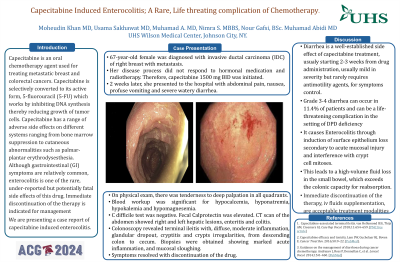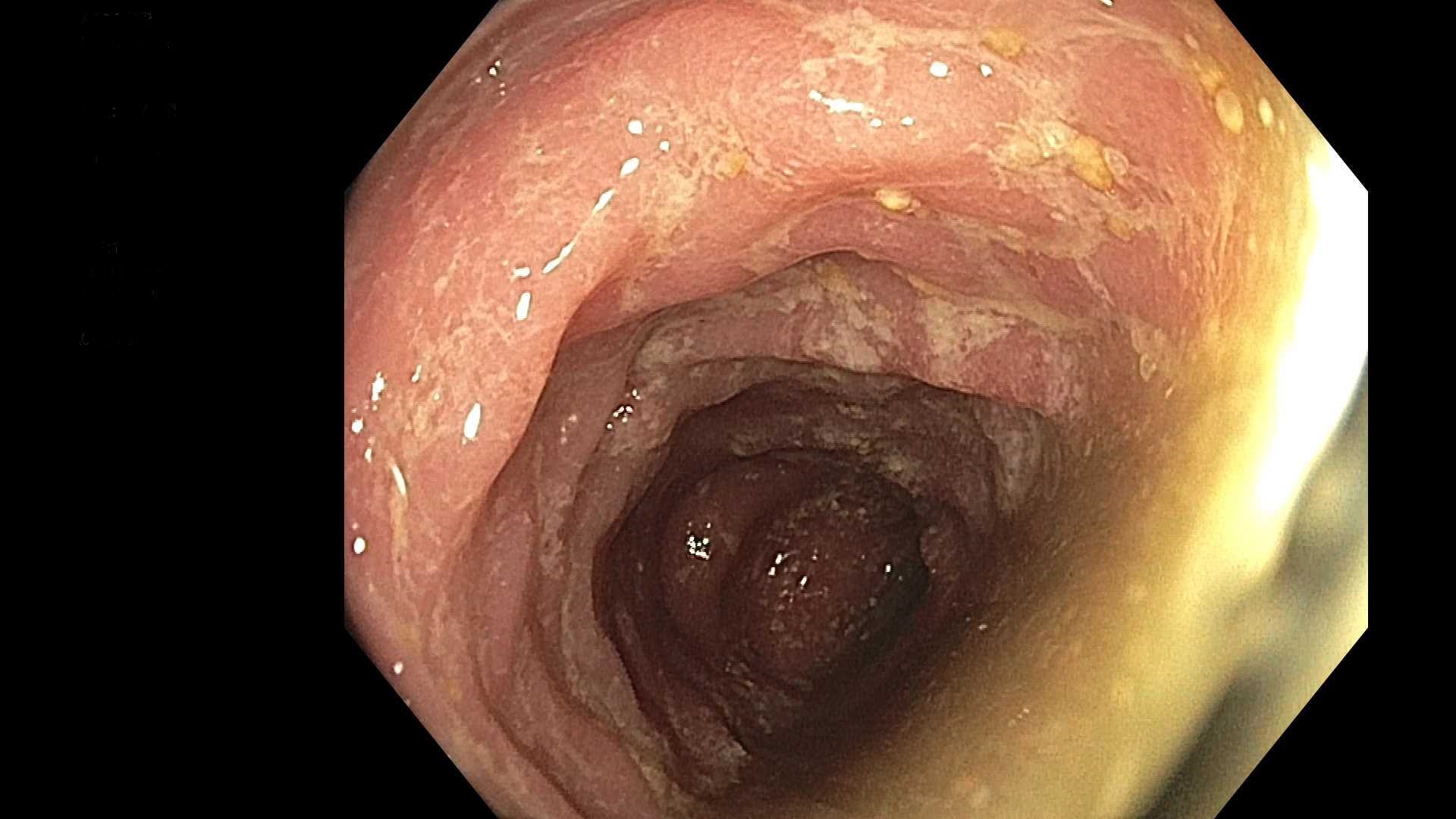Tuesday Poster Session
Category: Colon
P3755 - Capecitabine-Induced Enterocolitis: A Rare but Serious Side Effect
Tuesday, October 29, 2024
10:30 AM - 4:00 PM ET
Location: Exhibit Hall E

Has Audio
.jpeg.jpg)
Moheudin Khan, MD
United Health Services, Wilson Medical Center
Johnson City, NY
Presenting Author(s)
Moheudin Khan, MD1, Muhammad Ahmed, MD2, Nimra Sattar, MBBS3, Nour Gafsi, BSc4, Usama Sakhawat, MD5, Mohammad Abidi, MD6
1United Health Services, Wilson Medical Center, Johnson City, NY; 2United Health Services, Johnson City, NY; 3FMDC Islamabad, Johnson City, NY; 4United Health Services, Horseheads, NY; 5United Health Services, Wilson Medical Center, Binghamton, NY; 6United Health Services, Binghamton, NY
Introduction: Capecitabine is an oral chemotherapy agent used for treating metastatic breast and colorectal cancers. Capecitabine is selectively converted to its active form, 5-fluorouracil (5-FU) which works by inhibiting DNA synthesis thereby reducing growth of tumor cells. Capecitabine has a range of adverse side effects on different systems ranging from bone marrow suppression to cutaneous abnormalities such as palmar-plantar erythrodysesthesia. Although gastrointestinal (GI) symptoms are relatively common, enterocolitis is one of the rare, under-reported but potentially fatal side effects of this drug. We are presenting a case of capecitabine induced enterocolitis.
Case Description/Methods: 67-year-old female was diagnosed with invasive ductal carcinoma (IDC) of right breast with metastasis. Her disease process did not respond to hormonal medication and radiotherapy. Therefore, capecitabine 1500 mg BID was initiated. 2 weeks later, she presented to the hospital with abdominal pain, nausea, profuse vomiting and severe watery diarrhea. On physical exam, there was tenderness to deep palpation in all quadrants. Blood workup was significant for hypocalcemia, hyponatremia, hypokalemia and hypomagnesemia. C difficile test was negative. Fecal Calprotectin was elevated. CT scan of the abdomen showed right and left hepatic lesions, enteritis and colitis. She underwent a colonoscopy which revealed diffuse moderate inflammation from descending colon to cecum along with ileitis (Figure 1 & 2). Biopsies were obtained showing marked acute inflammation, and mucosal sloughing. Capecitabine was discontinued and her symptoms resolved completely. The patient was discharged on a different chemotherapy regimen (doxorubicin).
Discussion: The most common adverse GI side effects with capecitabine monotherapy include diarrhea, nausea, stomatitis, abdominal pain, and constipation. Enterocolitis and ischemic colitis are uncommon complications. Capecitabine exerts direct cytotoxic effect on GI mucosa leading to inflammation, edema, ulceration, and atrophy.
It has been recognized that dihydropyrimidine dehydrogenase (DPD) is the key enzyme required for 5-FU metabolism and a decrease in DPD activity leads to accumulation of 5-FU reaching toxic levels. Initial management includes discontinuation of the drug, IV hydration and electrolytes replacement. Broad spectrum antibiotics may be used before ruling out any ongoing infectious enterocolitis. Steroids such as oral budesonide have also been used.

Disclosures:
Moheudin Khan, MD1, Muhammad Ahmed, MD2, Nimra Sattar, MBBS3, Nour Gafsi, BSc4, Usama Sakhawat, MD5, Mohammad Abidi, MD6. P3755 - Capecitabine-Induced Enterocolitis: A Rare but Serious Side Effect, ACG 2024 Annual Scientific Meeting Abstracts. Philadelphia, PA: American College of Gastroenterology.
1United Health Services, Wilson Medical Center, Johnson City, NY; 2United Health Services, Johnson City, NY; 3FMDC Islamabad, Johnson City, NY; 4United Health Services, Horseheads, NY; 5United Health Services, Wilson Medical Center, Binghamton, NY; 6United Health Services, Binghamton, NY
Introduction: Capecitabine is an oral chemotherapy agent used for treating metastatic breast and colorectal cancers. Capecitabine is selectively converted to its active form, 5-fluorouracil (5-FU) which works by inhibiting DNA synthesis thereby reducing growth of tumor cells. Capecitabine has a range of adverse side effects on different systems ranging from bone marrow suppression to cutaneous abnormalities such as palmar-plantar erythrodysesthesia. Although gastrointestinal (GI) symptoms are relatively common, enterocolitis is one of the rare, under-reported but potentially fatal side effects of this drug. We are presenting a case of capecitabine induced enterocolitis.
Case Description/Methods: 67-year-old female was diagnosed with invasive ductal carcinoma (IDC) of right breast with metastasis. Her disease process did not respond to hormonal medication and radiotherapy. Therefore, capecitabine 1500 mg BID was initiated. 2 weeks later, she presented to the hospital with abdominal pain, nausea, profuse vomiting and severe watery diarrhea. On physical exam, there was tenderness to deep palpation in all quadrants. Blood workup was significant for hypocalcemia, hyponatremia, hypokalemia and hypomagnesemia. C difficile test was negative. Fecal Calprotectin was elevated. CT scan of the abdomen showed right and left hepatic lesions, enteritis and colitis. She underwent a colonoscopy which revealed diffuse moderate inflammation from descending colon to cecum along with ileitis (Figure 1 & 2). Biopsies were obtained showing marked acute inflammation, and mucosal sloughing. Capecitabine was discontinued and her symptoms resolved completely. The patient was discharged on a different chemotherapy regimen (doxorubicin).
Discussion: The most common adverse GI side effects with capecitabine monotherapy include diarrhea, nausea, stomatitis, abdominal pain, and constipation. Enterocolitis and ischemic colitis are uncommon complications. Capecitabine exerts direct cytotoxic effect on GI mucosa leading to inflammation, edema, ulceration, and atrophy.
It has been recognized that dihydropyrimidine dehydrogenase (DPD) is the key enzyme required for 5-FU metabolism and a decrease in DPD activity leads to accumulation of 5-FU reaching toxic levels. Initial management includes discontinuation of the drug, IV hydration and electrolytes replacement. Broad spectrum antibiotics may be used before ruling out any ongoing infectious enterocolitis. Steroids such as oral budesonide have also been used.

Figure: Figure 1 & 2
Disclosures:
Moheudin Khan indicated no relevant financial relationships.
Muhammad Ahmed indicated no relevant financial relationships.
Nimra Sattar indicated no relevant financial relationships.
Nour Gafsi indicated no relevant financial relationships.
Usama Sakhawat indicated no relevant financial relationships.
Mohammad Abidi indicated no relevant financial relationships.
Moheudin Khan, MD1, Muhammad Ahmed, MD2, Nimra Sattar, MBBS3, Nour Gafsi, BSc4, Usama Sakhawat, MD5, Mohammad Abidi, MD6. P3755 - Capecitabine-Induced Enterocolitis: A Rare but Serious Side Effect, ACG 2024 Annual Scientific Meeting Abstracts. Philadelphia, PA: American College of Gastroenterology.
